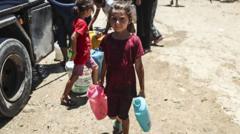Amid escalating violence in Gaza, a significant segment of Israeli society is increasingly vocal in rejecting ongoing military operations, leading to nationwide protests and calls for peace.
Israeli Public Opinion Shifts Amid Escalating Gaza Conflict

Israeli Public Opinion Shifts Amid Escalating Gaza Conflict
As Israel's military actions intensify, growing dissent within the country reveals a critical reevaluation of the war's conduct.
As the conflict in Gaza intensifies, a notable shift in public sentiment is emerging in Israel. Criticism of the government's strategy and its implications is becoming more pronounced, as prominent figures openly express concerns about the nation's trajectory. Notably, Yair Golan, a left-leaning politician and former deputy commander of the Israel Defense Forces (IDF), cautioned that Israel risks becoming a "pariah state" akin to South Africa if it does not revert to rational governance. "A sane state does not wage war against civilians, does not kill babies as a hobby," he articulated, sparking immediate backlash from Prime Minister Benjamin Netanyahu, who branded the statement as "blood libel."
The conversation has expanded, with former Israeli defense minister Moshe "Bogi" Ya'alon asserting that the current approach reflects a government policy aimed at preserving power, despite leading the nation toward destruction. This commentary is particularly striking given the backdrop of the current conflict, which reignited after Hamas's incursion that resulted in significant Israeli casualties and mass hostage-taking just 19 months prior.
Currently, the health system in Gaza is reportedly overwhelmed due to the ongoing offensive, alongside severe challenges in delivering humanitarian aid amidst a prolonged blockade. Although a recent poll indicates that 61% of the Israeli populace favors ending the war, realities on the ground remain complex. The government insists on the necessity of dismantling Hamas and securing the release of hostages, while Netanyahu maintains his pursuit of "total victory" amidst unwavering support from a core group within the population.
As dissent grows, rallies have emerged, including one in which around 500 protesters showcased their opposition to the war, carrying images of Palestinian children killed in airstrikes. Protest organizers, including the coalition Standing Together, comprised of both Jewish and Palestinian participants, argue for an end to hostilities and emphasize the risks to both hostages and Israeli lives.
Earlier this year, thousands of Israeli reservists urged for a halt to military action in favor of negotiations to secure the release of hostages, highlighting the breadth of public frustration. However, opposition views persist; some Israelis continue to defend military actions in Gaza, arguing that the populace is complicit in supporting a terrorist organization.
International responses are also evolving as the UK implements fresh sanctions against Israel, while the EU is reconsidering its long-standing association with the country amid rising humanitarian concerns. As international pressure mounts, a growing discourse within Israeli society reveals a faction urging a cessation of conflict to avert worsening humanitarian crises and bolstering national unity. "The mood is changing," activist Uri Weltmann remarked, hinting at a collective reevaluation of conflict strategies that could reshape Israel's future engagement in the region.





















